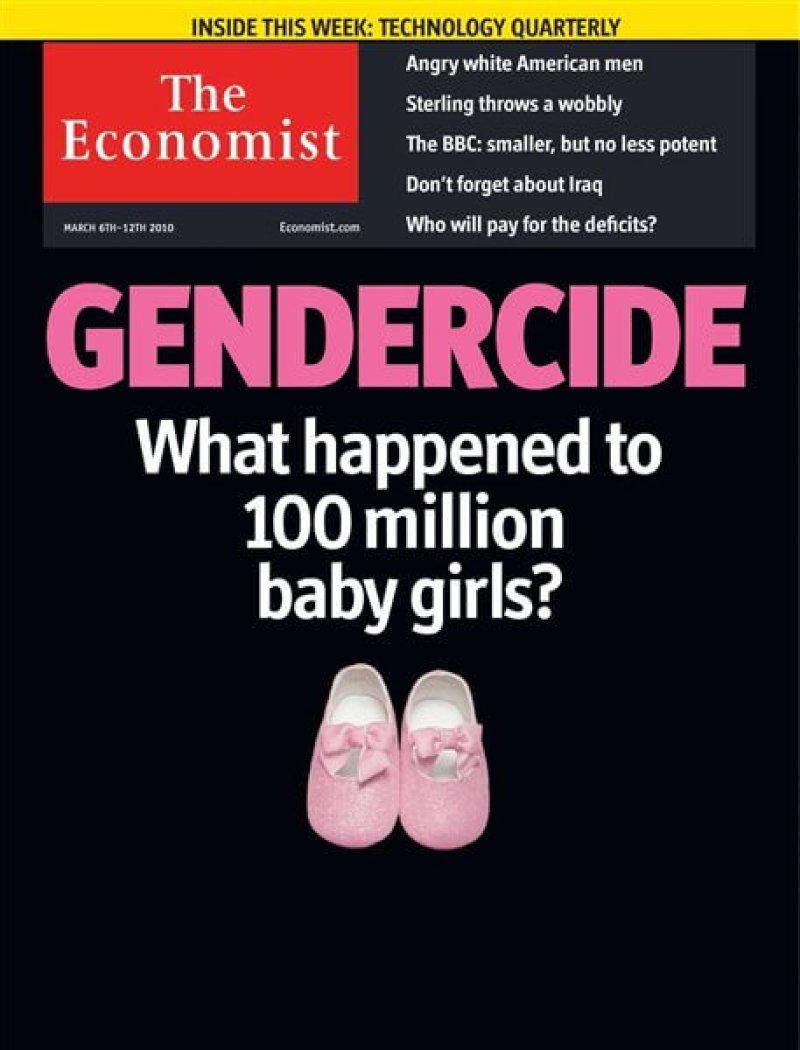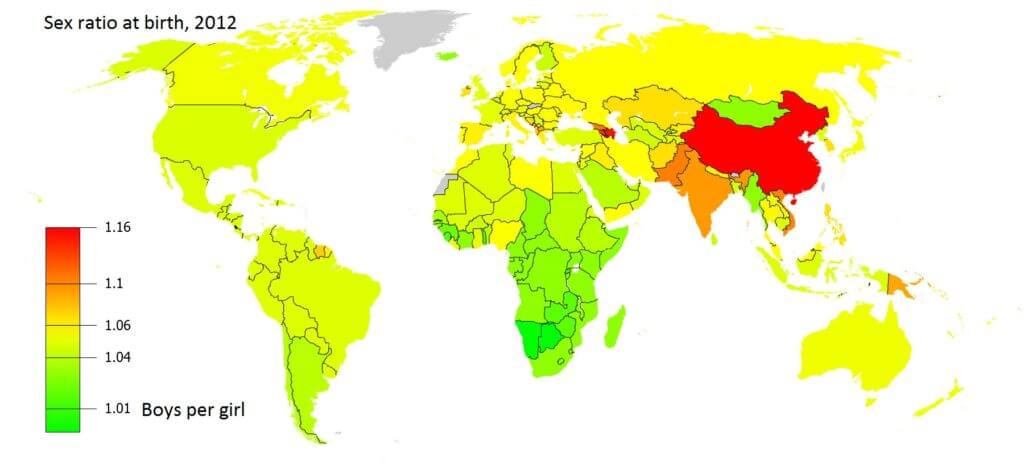In China, there were 118 boys born for every 100 girls according to the 2010 census. In India, the ratio was 109.5 boys for every 100 girls. Both of those figures represent substantial departures from the global natural live birth ratio of about 105. [‘Natural’ adult male-female ratios are nearly identical but males ‘naturally’ over-produce because of a higher death rate at brith.] The skewed ratios are generally blamed on a cultural preference toward male children — one that leads families to terminate pregnancies when the fetus is female. Concerns about the possibility of sex selective birth terminations have prompted a British ethics group to support censoring of genetic test results to remove the possibility that a family might use abortion as a way to choose the sex of a child. This recommendation comes despite the fact that sex-selective abortion isn’t a problem in the UK.
The Nuffield Council on Bioethics recently issued a report on the ethics of non-invasive prenatal testing (NIPT). This testing gives parents information about chromosomal disorders like Down syndrome, early childhood disease like cystic fibrosis and identifies the sex of the child. The blood test is done early in pregnancy, starting at 10 weeks. In the report, the bioethicists suggest that parents not be told sex results because of the risk that parents might abort if the fetus is female.
Professor Tom Shakespeare, chair of the body’s working group on NIPT, said in a press release: “We strongly believe there should be a ban on its use to find out the sex of the fetus, as this could lead to sex-selective abortions.”
But Britain doesn’t have the same skewed sex ratios that alarm public health experts in China and the India. Its birth ratios have hovered around 105 for the past century, according to the UK’s Office for National Statistics. The British Pregnancy Advisory Service told the BBC, “We should be absolutely clear that there is no peer-reviewed evidence of sex-selective abortion taking place in the UK.”
 The Nuffield Council said that testing should still be used to look for chromosomal abnormalities that cause conditions like Down syndrome and other trisomies. And information about the sex of the fetus should be returned when chromosomes are abnormal. Genes for diseases of early childhood like cystic fibrosis should be reported back to parents. But testing companies should not scan the entire genome and report gene variants that might be related to disease in later life like cancer or Alzheimer’s disease. That is prudent. People carry loads of gene variants that increase the risk of adult disease development without ever getting sick. The reasons for this are not all understood. Currently, most if not all NIPT companies do not do genome-wide scans, but screen for particular genes linked to childhood diseases and chromosomal abnormalities.
The Nuffield Council said that testing should still be used to look for chromosomal abnormalities that cause conditions like Down syndrome and other trisomies. And information about the sex of the fetus should be returned when chromosomes are abnormal. Genes for diseases of early childhood like cystic fibrosis should be reported back to parents. But testing companies should not scan the entire genome and report gene variants that might be related to disease in later life like cancer or Alzheimer’s disease. That is prudent. People carry loads of gene variants that increase the risk of adult disease development without ever getting sick. The reasons for this are not all understood. Currently, most if not all NIPT companies do not do genome-wide scans, but screen for particular genes linked to childhood diseases and chromosomal abnormalities.
One big problem with how tests are now used, the council said, is the lack of counseling that comes along when the results are returned. That is not unique to NIPT testing. Many experts are concerned that poor understanding of genetics even within the medical community, coupled with limited time resources, means that patients get gene tests back without the proper explanation of risk. Actress Angelina Jolie’s decision to undergo radical preventative mastectomy and oopherctomy after testing positive for breast cancer genes led medical professionals to coin the term ‘Angelina Effect’ as they saw other patients follow suit. In the case of NIPT, this might mean families would move forward with a termination without getting additional tests, like amniocentesis, to follow up on the genetic testing results. From the BBC:
The report says there have been instances where the NHS was “left to pick up the pieces” after women had been told that they had a high chance of carrying a baby with a genetic disease based on their NIPT result but had not been given sufficient follow-up. One woman who used a private testing service told the Nuffield Council: “My results were delivered via a telephone call on a Friday teatime. I was then told if I needed to know more to phone back on Monday. In the meantime arrangements would be made to facilitate a termination.”
Preferentially keeping some genetic information from people, but not others, seems arbitrary. The Nuffield Council in the UK thinks sex chromosome information should be withheld. In the US, the Texas legislature recently passed a bill allowing physicians to keep results about trisomies and other lethal fetal malformations from their patients if the doctor is worried that the family might terminate the pregnancy. The bill also protects the doctor from being sued afterward. Because these decisions are deeply personal and irrevocable, it might be more prudent to give people correct information and implement policies that reverse the cultural stigma surrounding female children or make it easier to raise a child who will need extensive care.
Indeed, several UK patient advocacy groups came out against the guidelines because of this. From the Telegraph:
But the report was criticised by Genetic Alliance UK, a charity for patients affected by genetic disorders, which described it as “poor quality”. The group believes restricting the availability of NIPT would “reduce and delay access to information which could inform reproductive choice”. A spokesman said parents should have the right to screen not just for neonatal conditions and those which occur in early childhood, but also for early onset dementia and neuromuscular condition such as Parkinson’s and Muscular Sclerosis. The British Pregnancy Advisory Service also rejected the report, which it said was “permeated by a mistrust of women and the reproductive choices they make”.
Similarly to the UK, the US does not have a problem with sex selective abortion based on birth ratios. Birthrates here align with natural ratios. We have no federal ban against the practice. Some states have tried to pass abortion bans based on race, sex and genetic abnormality but those have been largely unsuccessful.
The use of genetics in medicine is here to stay. Medical technologies don’t usually get rolled back. Instead, they get replaced by something better. Medicine and public policy need to adapt to this new reality, rather than censor genetic information.
Meredith Knight is a frequent contributor to the Genetic Literacy Project and a freelance science and health writer based in Austin, Texas. Follow her @meremereknight
For more background on the Genetic Literacy Project, read GLP on Wikipedia.
































